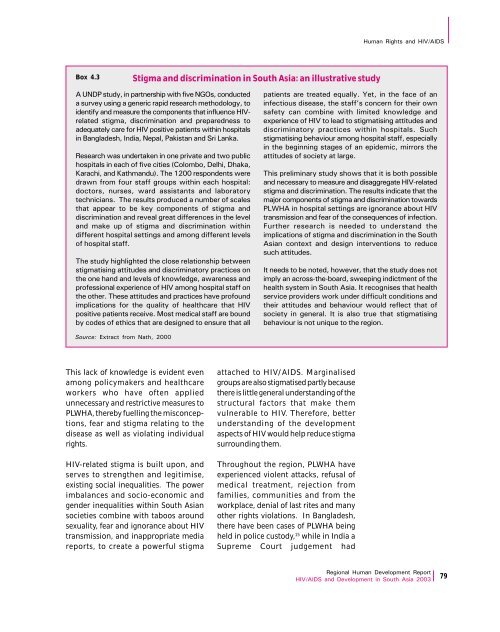Download Report - UNDP Asia-Pacific Regional Centre - United ...
Download Report - UNDP Asia-Pacific Regional Centre - United ...
Download Report - UNDP Asia-Pacific Regional Centre - United ...
You also want an ePaper? Increase the reach of your titles
YUMPU automatically turns print PDFs into web optimized ePapers that Google loves.
Human Rights and HIV/AIDSBox 4.3Stigma and discrimination in South <strong>Asia</strong>: an illustrative studyA <strong>UNDP</strong> study, in partnership with five NGOs, conducteda survey using a generic rapid research methodology, toidentify and measure the components that influence HIVrelatedstigma, discrimination and preparedness toadequately care for HIV positive patients within hospitalsin Bangladesh, India, Nepal, Pakistan and Sri Lanka.Research was undertaken in one private and two publichospitals in each of five cities (Colombo, Delhi, Dhaka,Karachi, and Kathmandu). The 1200 respondents weredrawn from four staff groups within each hospital:doctors, nurses, ward assistants and laboratorytechnicians. The results produced a number of scalesthat appear to be key components of stigma anddiscrimination and reveal great differences in the leveland make up of stigma and discrimination withindifferent hospital settings and among different levelsof hospital staff.The study highlighted the close relationship betweenstigmatising attitudes and discriminatory practices onthe one hand and levels of knowledge, awareness andprofessional experience of HIV among hospital staff onthe other. These attitudes and practices have profoundimplications for the quality of healthcare that HIVpositive patients receive. Most medical staff are boundby codes of ethics that are designed to ensure that allpatients are treated equally. Yet, in the face of aninfectious disease, the staff’s concern for their ownsafety can combine with limited knowledge andexperience of HIV to lead to stigmatising attitudes anddiscriminatory practices within hospitals. Suchstigmatising behaviour among hospital staff, especiallyin the beginning stages of an epidemic, mirrors theattitudes of society at large.This preliminary study shows that it is both possibleand necessary to measure and disaggregate HIV-relatedstigma and discrimination. The results indicate that themajor components of stigma and discrimination towardsPLWHA in hospital settings are ignorance about HIVtransmission and fear of the consequences of infection.urther research is needed to understand theimplications of stigma and discrimination in the South<strong>Asia</strong>n context and design interventions to reducesuch attitudes.It needs to be noted, however, that the study does notimply an across-the-board, sweeping indictment of thehealth system in South <strong>Asia</strong>. It recognises that healthservice providers work under difficult conditions andtheir attitudes and behaviour would reflect that ofsociety in general. It is also true that stigmatisingbehaviour is not unique to the region.Source: Extract from Nath, 2000This lack of knowledge is evident evenamong policymakers and healthcareworkers who have often appliedunnecessary and restrictive measures toPLWHA, thereby fuelling the misconceptions,fear and stigma relating to thedisease as well as violating individualrights.HIV-related stigma is built upon, andserves to strengthen and legitimise,existing social inequalities. The powerimbalances and socio-economic andgender inequalities within South <strong>Asia</strong>nsocieties combine with taboos aroundsexuality, fear and ignorance about HIVtransmission, and inappropriate mediareports, to create a powerful stigmaattached to HIV/AIDS. Marginalisedgroups are also stigmatised partly becausethere is little general understanding of thestructural factors that make themvulnerable to HIV. Therefore, betterunderstanding of the developmentaspects of HIV would help reduce stigmasurrounding them.Throughout the region, PLWHA haveexperienced violent attacks, refusal ofmedical treatment, rejection fromfamilies, communities and from theworkplace, denial of last rites and manyother rights violations. In Bangladesh,there have been cases of PLWHA beingheld in police custody, 15 while in India aSupreme Court judgement had<strong>Regional</strong> Human Development <strong>Report</strong>HIV/AIDS and Development in South <strong>Asia</strong> 2003 79
















